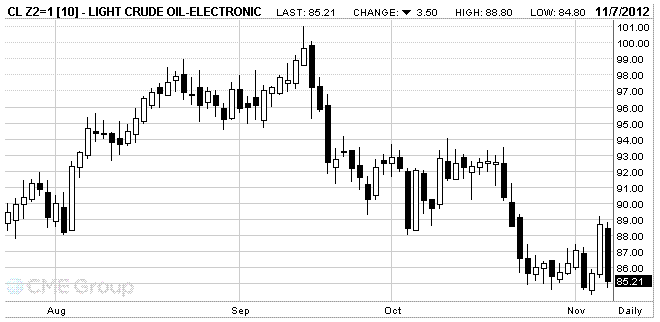- Analytics
- News and Tools
- Market News
- Price of oil futures fell
Price of oil futures fell
Oil prices continued their decline after a U.S. government report showed an increase in reserves for the fourth time in five weeks.
Oil reserves increased by 1.77 million barrels to 374.8 million barrels level last week. Stocks are forecast to fall by were 2 million barrels.
Gasoline stocks rose 2.9 million barrels, or 1.4% - to 202.4 million barrels, but were still up 0.9% compared to last year. Analysts had expected gasoline inventories fell by 1 million barrels.
Demand for gasoline in the four weeks ended November 2, increased by 0.2% on an annualized basis, and the average was at 8.6 million barrels a day.
Note that U.S. refineries operated at 85.4% of the total capacity, which is 2.3% lower compared to the previous week. Analysts expected capacity to fall to 86.2 percent.
Distillate stocks, which include diesel and heating oil, rose by 100,000 barrels to 118.1 million barrels levels, but analysts had expected distillate stocks fell by 2 million barrels.
Industry-funded American Petroleum Institute said yesterday that inventories fell 27,000 barrels last week to the level of 371.7 million barrels.
Futures also fell, as victory in the U.S. presidential election won. At the same time, Greece today voted in favor of the austerity measures. Note also that the U.S. president will hold talks with the Congress to avoid a financial break in the country.
December futures price of U.S. light crude oil WTI (Light Sweet Crude Oil) fell to 85.15 dollars a barrel on the New York Mercantile Exchange.
December futures price for North Sea petroleum mix of mark Brent fell $ 3.20 to 107.80 dollars a barrel on the London Stock Exchange ICE Futures Europe.

© 2000-2026. All rights reserved.
This site is managed by Teletrade D.J. LLC 2351 LLC 2022 (Euro House, Richmond Hill Road, Kingstown, VC0100, St. Vincent and the Grenadines).
The information on this website is for informational purposes only and does not constitute any investment advice.
The company does not serve or provide services to customers who are residents of the US, Canada, Iran, The Democratic People's Republic of Korea, Yemen and FATF blacklisted countries.
Making transactions on financial markets with marginal financial instruments opens up wide possibilities and allows investors who are willing to take risks to earn high profits, carrying a potentially high risk of losses at the same time. Therefore you should responsibly approach the issue of choosing the appropriate investment strategy, taking the available resources into account, before starting trading.
Use of the information: full or partial use of materials from this website must always be referenced to TeleTrade as the source of information. Use of the materials on the Internet must be accompanied by a hyperlink to teletrade.org. Automatic import of materials and information from this website is prohibited.
Please contact our PR department if you have any questions or need assistance at pr@teletrade.global.















